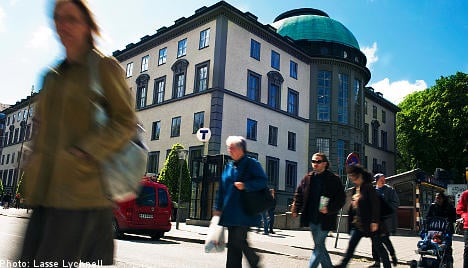Gotland University languished at the bottom of the list for the fifth consecutive year in the list compiled by independent academic group Urank.
Lund University raced to the top of both the Healthcare & Medicine and Science & Technology subcategories, while the Stockholm School of Economics headed the field in Humanities & Social Sciences.
Statistician Stig Forneng of Urank said it was unsurprising that several of Sweden’s grand old seats of learning ranked higher than many of the smaller colleges. The traditional universities benefited from their greater resources and more attractive courses for high status professions such as medicine, engineering and veterinary, he said.
Gotland University’s surfeit of distance courses contributed to it remaining rooted at the bottom of the list. This also explains the unexpected appearance of Mid Sweden University just four places from the bottom.
“We attach value to the attainment of degrees by a large number of students. With distance learning, you maybe just take the occasional module, and that leads to a worse outcome,” said Forneng.
“Offering individual modules is one of the tasks of a seat of learning, but if you look at the overall quality there’s also particular value in offering advanced level courses.”
Urank uses a large number of statistical variables when putting together its list. For example, it examines the academic quality of students accepted to courses, the weight attached to research, and the proportion of research students with an international background.
However, the ranking does not measure the quality of individual courses. It also disregards the quality of student life and the availability of accommodation, one of the most important issues affecting students’ choice of college or university.
Karolinska was the top ranking Swedish university earlier this month in the Times Higher Education supplement rankings for 2010-2011, coming in at 43 on the world list and 9 on the European list.
Urank’s list of Sweden’s top 30 colleges and universities (last year’s ranking in parentheses):
1 (2) Stockholm School of Economics
2 (1) Karolinska Institutet
3 (3) Swedish University of Agricultural Sciences
4 (9) Royal Institute of Technology (KTH)
5 (4) Uppsala University
6 (6) Chalmers University of Technology
7 (5) Lund University
8 (7) Gothenburg University
9 (10) Stockholm University
10 (8) Linköping University
11 (11) Umeå University
12 (15) Örebro University
13 (14) Södertörn University
14 (12) Luleå Universtiy of Technology
15 (21) Jönköping University
16 (17) Växjö University
17 (18) Malmö University
18 (25) University of Kalmar
19 (27) Blekinge Institute of Technology
20 (13) Universtiy of Borås
21 (20) Mälardalen University
22 (26) Halmstad University
23 (19) Karlstad University
24 (29) University of Skövde
25 (28) University of Gävle
26 (24) Dalarna University
27 (16) Mid Sweden University
28 (22) Kristianstad University
29 (23) University West
30 (30) Gotland University



 Please whitelist us to continue reading.
Please whitelist us to continue reading.
Member comments